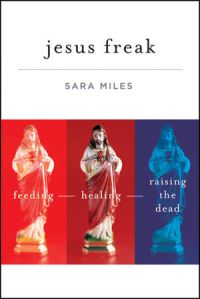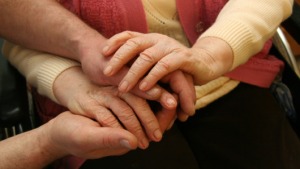
Over the next five weeks, I’ll be spending my Tuesday evenings discussing Sara Miles’ Jesus Freak: Feeding, Healing, Raising the Dead with a group of adults – young (ish), old, retired Methodist ministers (there’s like 6 of them!), lawyers – who all want to dig deeper into what it means to be a Jesus Freak (which I will get back to soon). We met for the first time this past Tuesday and I left excited for the conversation we’ll be having as we all work through this book. There is so much to talk about in Miles’ work, so each Friday for the next five weeks I’ll be posting about the previous week’s reading. We kick off today with the introduction and first chapter, “Come and See.” Ready?
I began this book with zero knowledge of Sara Miles, so here’s a little background information I learned on Tuesday – Miles is the founder and director of The Food Pantry at St. Gregory of Nyssa Espicopal  Church in San Francisco, who was raised an atheist and had a powerful conversion experience at the age of 46, and has been in a committed relationship with her wife Martha for more than 15 years. Now if that doesn’t peak your interest, you can stop reading here.
Church in San Francisco, who was raised an atheist and had a powerful conversion experience at the age of 46, and has been in a committed relationship with her wife Martha for more than 15 years. Now if that doesn’t peak your interest, you can stop reading here.
On the third page of Jesus Freak, Miles gets right into it. She asks, “…what would it mean to live as if you – and everyone around you – were Jesus, and filled with his power? To just take his teachings literally, go out the front door of your home, and act on them?” (ix).
This is the central question – what does it mean to be a Jesus Freak? When we met on Tuesday, we talked about what images came to mind when we heard to phrase “Jesus Freak.” The most common among the group? Hippie. Pushy Evangelical. 60s and 70s. The dc Talk song from 1995.
I immediately thought of middle school, when being a Jesus Freak was super cool in my social circles. I have to disclose that I was home schooled, from 4th grade through my high school graduation, and very, very involved in my youth group (a downtown social justice and mission-minded congregation). To me, 6th and 7th grades were times when you weren’t Christian but you loved Jesus, and your religious beliefs on MySpace read “Follower of Jesus” or “Jesus Freak.” Now, I associate that time with the superficial nature of teenagers who just want to be in with their peers. For me, my peers were mostly Christians who flaunted it (but only if they didn’t have to explain why or what they really believed). So Sara Miles trying to reclaim “Jesus Freak” is an exciting and daunting task.
Though there is so much to talk about in the first 30 pages, there are three things I want to touch on  here. The first is an amazingly profound statement – “If Jesus is about anything, it’s the inconvenient truth that a spiritual life is a physical life” (xviii). Just think about that for a second. Miles is saying that Christians (and I would argue religious people of most any tradition) cannot just get by on inner spirituality. Physical acts of humility, justice, mercy, and love are just as important. We have to interact with God’s world to continue to walk forward with God.
here. The first is an amazingly profound statement – “If Jesus is about anything, it’s the inconvenient truth that a spiritual life is a physical life” (xviii). Just think about that for a second. Miles is saying that Christians (and I would argue religious people of most any tradition) cannot just get by on inner spirituality. Physical acts of humility, justice, mercy, and love are just as important. We have to interact with God’s world to continue to walk forward with God.
The second point brings up the outcasts in our society – the homeless, the hungry, the minority (religious and racial/ethnic), the sick. Miles reminds us that people like Mary, an unmarried teen who gave birth to Jesus Christ in stable, and John the Baptist, a madman who baptized the Son of God in the river Jordan – “improper figures, completely unauthorized by the religious authorities” (6) – were chosen to share the love and power of the divine. The outcast and the stranger, existing on the fringes of society, bring the holy into the profane spaces of a stable or a river.

This relates perfectly to the last statement I want to talk about, which is the idea that victims are necessary because they “define the center” (10). Societies and religions need the outcast so they know they are righteous and normal, reflecting the dangerous impulse we as humans feel to “Other” those who are not like us. We all do it. I’ve “Othered” people of different socioeconomic statuses than myself (and usually those of higher status, to be honest). But Jesus, through the many parables he tells and the many acts of mercy and love he performs, shows us that it is not up to us to decide whom God loves. We, as mere humans, do not get to choose whether that person standing on the corner or the CEO in the cushy corner office are “normal” or whether they are part of the family. No one, not Christians nor Muslims nor Hindus nor Atheists, have the authority to make that decision. And the figure of Jesus sends that message loud and clear.
Obviously, I could go on for hours. Sara Miles is a wonderful writer and Jesus Freak is full of powerful statements and questions. I’ll stop for today, but I’ll be back next Friday with more from Sara Miles and Jesus Freak.
 We’ve come to the end of Sara Miles’ Jesus Freak, and it was an interesting, thought-provoking read. I recommend it to people who grew up in the church in particular, since Miles’ faith journey begins as a middle-aged adult. This fresh perspective brought my attention to things I had never given much thought to before, like the many ways to heal or the role of communion to feed physically and spiritually or the fact that we are always forgiven by God whether we want to be or not.
We’ve come to the end of Sara Miles’ Jesus Freak, and it was an interesting, thought-provoking read. I recommend it to people who grew up in the church in particular, since Miles’ faith journey begins as a middle-aged adult. This fresh perspective brought my attention to things I had never given much thought to before, like the many ways to heal or the role of communion to feed physically and spiritually or the fact that we are always forgiven by God whether we want to be or not. Celebrating someone’s life after they have died: when we remember joyfully the kindness, the joy, the passion, the funny little nuances of someone’s life, we keep their spirit alive among us
Celebrating someone’s life after they have died: when we remember joyfully the kindness, the joy, the passion, the funny little nuances of someone’s life, we keep their spirit alive among us










 here. The first is an amazingly profound statement – “If Jesus is about anything, it’s the inconvenient truth that a spiritual life is a physical life” (xviii). Just think about that for a second. Miles is saying that Christians (and I would argue religious people of most any tradition) cannot just get by on inner spirituality. Physical acts of humility, justice, mercy, and love are just as important. We have to interact with God’s world to continue to walk forward with God.
here. The first is an amazingly profound statement – “If Jesus is about anything, it’s the inconvenient truth that a spiritual life is a physical life” (xviii). Just think about that for a second. Miles is saying that Christians (and I would argue religious people of most any tradition) cannot just get by on inner spirituality. Physical acts of humility, justice, mercy, and love are just as important. We have to interact with God’s world to continue to walk forward with God.